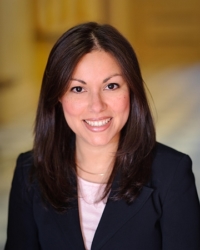The natural products industry is host to a treasure trove of creative, intelligent and dedicated individuals that contribute to its success daily. This year, WholeFoods Magazine is starting a tradition of naming a Natural Products Industry Person of the Year, someone we believe has made a tremendous impact on the industry in the previous year.
The field was thick with possibilities for this honor, but one person stood out from the crowd. This year, we are thrilled to name Megan Westgate, executive director of the Non-GMO Project, Bellingham, WA, as our first Natural Products Industry Person of the Year in recognition of her remarkable contributions to the non-GMO movement.
If you need a little inspiration to tackle a challenge that feels insurmountable, perhaps you should read about Megan Westgate, executive director of the Non-GMO Project. This dynamic 30-something played a huge role in shaping one of the fastest growing areas of the natural products industry today: non-GMO labeled foods.
Westgate shows no signs of resting on her laurels. In fact, 2014 was a big year for her. Under her leadership, Westgate saw sales of Non-GMO Project Verified products soar 70% from the previous year to $8.5 billion. She oversaw the verification of more than 22,000 non-GMO products, helped advocate and raise awareness for mandatory GMO labeling at the state level, co-authored a book called Yoga for Pregnancy and continued the remodeling of her family’s new grocery store in Washington State. Oh yeah, and she gave birth to a beautiful baby boy.
Her tireless dedication to the natural products industry and the contributions she made in 2014 make WholeFoods Magazine proud to name her our Person of the Year.
Starting the Journey
Westgate grew up in rural western Massachusetts, where she was raised eating healthy natural foods fresh from the garden or her local co-op. It wasn’t until she went away to college—graduating from Scripps College (part of The Claremont Colleges consortium) in Claremont, CA—that she fully understood how so many of her peers had very different food experiences than she had as a child. “Growing up that way primed me for being concerned about healthy food and the access challenges that increasingly exist,” says Westgate.
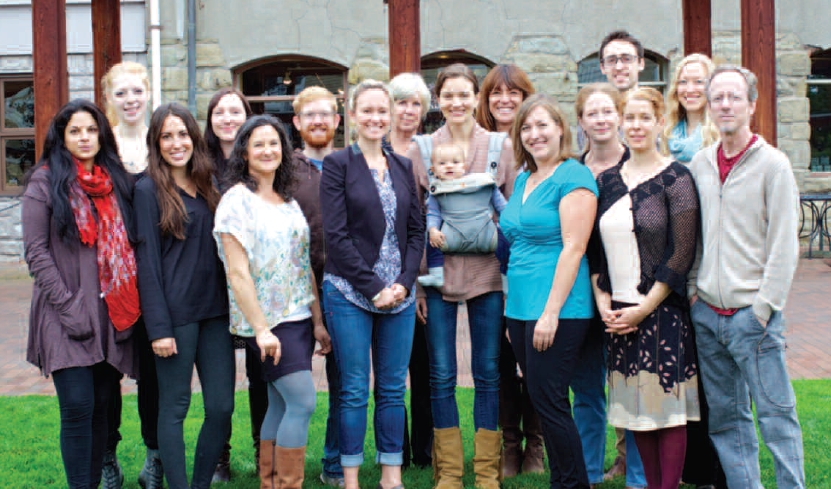
|
|
| The Non-GMO Project staff |
At college, the young art major first learned about genetically modified organisms while serving as an activist. Keck Graduate Institute had recently joined the Claremont consortium and was dedicated to biosciences with a heavy emphasis on biotechnology. Its new campus was set be developed on the Bernard Field Station, one of the last open spaces in Los Angeles County and home to an endangered ecosystem. Westgate joined the fight to protect the 86 acres and in the process, learned a lot about the Institute that wanted to develop the space and what it was teaching students.
It was 2001, and GMOs and biotechnology were just entering the public’s consciousness, “but as soon as I started hearing about it, I became concerned,” says Westgate. “That started me down my path.”
Fast forward a few years after Westgate’s graduation. She had been putting her passion for non-GMO, natural foods to work at Food Conspiracy Co-op in Tucson, AZ, as a marketing and outreach coordinator. The store had a shelf-tag labeling program to educate shoppers about which products were GMO, which weren’t and where the risk was. “It was a really labor-intensive process,” she recalls, explaining that to put such information on the shelf for shoppers to see, she had to cross-check every ingredient label against a binder of information she made about GMO-risk ingredients (not easy to find in those days) and details the store collected from each vendor about whether it tested for GMOs and its non-GMO policy. “It was a worthwhile effort, but incredibly inefficient,” she states.
Through The Organic and Non-GMO Report, Westgate heard about a project underway at The Big Carrot in Toronto, Canada, and The Natural Grocery Co. of Berkeley, CA. The pair of retailers envisioned having standardized labeling for non-GMO products and had teamed up with the Global ID Group to lay the groundwork for a non-GMO testing and certification program. “That just made so much sense to me based on the experience I was having at retail,” said Westgate.
She reached out to the California store, started volunteering full time to get the group incorporated as a non-profit and before long, was hired to be the first executive director of the Non-GMO Project in February of 2007.
At the Helm
From today’s vantage point—where millions of shoppers seek out non-GMO products daily—it might seem as though once established, a non-GMO labeling program would be an easy sell. But in fact, Westgate initially found herself in an uphill battle. It took two years just to develop the standards her group would use to verify non-GMO products, as Westgate firmly believed finding the right balance between meaningfulness, achievability and industry support was key to the label’s success. To this day, the group still seeks to improve standards and address any concerns raised in its annual public comment period.
|
Five Things You Didn’t Know Many industry companies have worked with Megan Westgate through her role as executive director of the Non-GMO Project. But, there’s a lot that makes this incredible young woman tick. No matter how full her plate becomes, she holds a firm belief in keeping a healthy work–life balance through it all.
1. Westgate and her husband, Noah, are the proud parents of Robin Wilder, born in March 2014. Her little boy is her constant reminder of the importance of preserving a safe and healthy food supply for future generations. |
“When I got involved with this, I really had very little knowledge about the food production side of the equation. I really underestimated how challenging it would be at first,” she says, adding, “There was a lot of fear and resistance to the whole concept in the beginning.”
Westgate found that many industry companies didn’t want to talk about the idea of possible GMO contamination in their products at all. They felt any contamination wasn’t their fault, and they didn’t want the issue to come to light.
Changing this mentality was no small feat. “There were times at the beginning when I wondered to myself whether the logo would ever actually be on a product,” she states. “Five years ago, that was still very much a question.”
But Westgate kept at it, despite all the resistance, literally talking every new enrollee into the idea of non-GMO labeling and pulling people along to promote it. She also forged partnerships with several well-respected CEOs from veteran companies of the industry such as Nature’s Path, Organic Valley, UNFI, Eden Foods and Lundberg Family Farms, who became some of the group’s first members of its board of directors. “They took a stand because they recognized that the gap between consumer expectations and marketplace reality was a huge liability and the industry needed to be proactive about doing testing and cleaning up contamination,” she states.
With their backing and other like-minded leaders, the group moved forward by fine-tuning standards and not shying away from adversity. When companies didn’t like aspects of the standards, Westgate insisted on a policy of listening, learning and responding constructively. “We’ve overcome a lot of obstacles in that way, and it continues to be a really important part of our strategy,” she states. “The goal is for as many people as possible to feel ownership and be part of this movement.”
While the organization was incorporated in 2007, it wasn’t until 2010 that the first Non-GMO Project Verified label hit the market. That year, sales of Non-GMO Project Verified products totaled $348.8 million, and sales have grown nearly 2,400% since then, reaching $8.5 billion in 2014. “I’m still completely blown away by how much visibility there is for the Non-GMO Project Verified butterfly logo in today’s market,” she says, noting how the logo almost has a life of its own, with stores promoting it in their own creative ways and brands proudly and enthusiastically displaying it—not a drop of convincing required.
Just how did Westgate move the needle from zero to billions in just four years? She won’t take credit for the growth alone. “It’s been an amazing combination of so many people being so passionate about this. It felt like something that just wanted to happen and it’s been my honor to facilitate it into being,” says Westgate.
Tomorrow’s Non-GMO Reach
Despite her group’s incredible influence on the U.S. food market and the industry, Westgate feels their job is just beginning. “To this day, there is still no regulation of non-GMO claims. Anyone can put ‘non-GMO’ on their product without doing any testing or oversight. That has been a big focus of the Non-GMO Project; to bring consistency and transparency to non-GMO claims…that really was the missing link prior to the Non-GMO Project,” says Westgate.
Westgate wants to see continued unification of non-GMO standards and labeling, and recently opened the door for qualified certification bodies to be eligible to train to become technical administrators of the group’s standards. The group also regularly audits its technical administrators to ensure standards are being applied correctly—the basis of the group’s integrity.
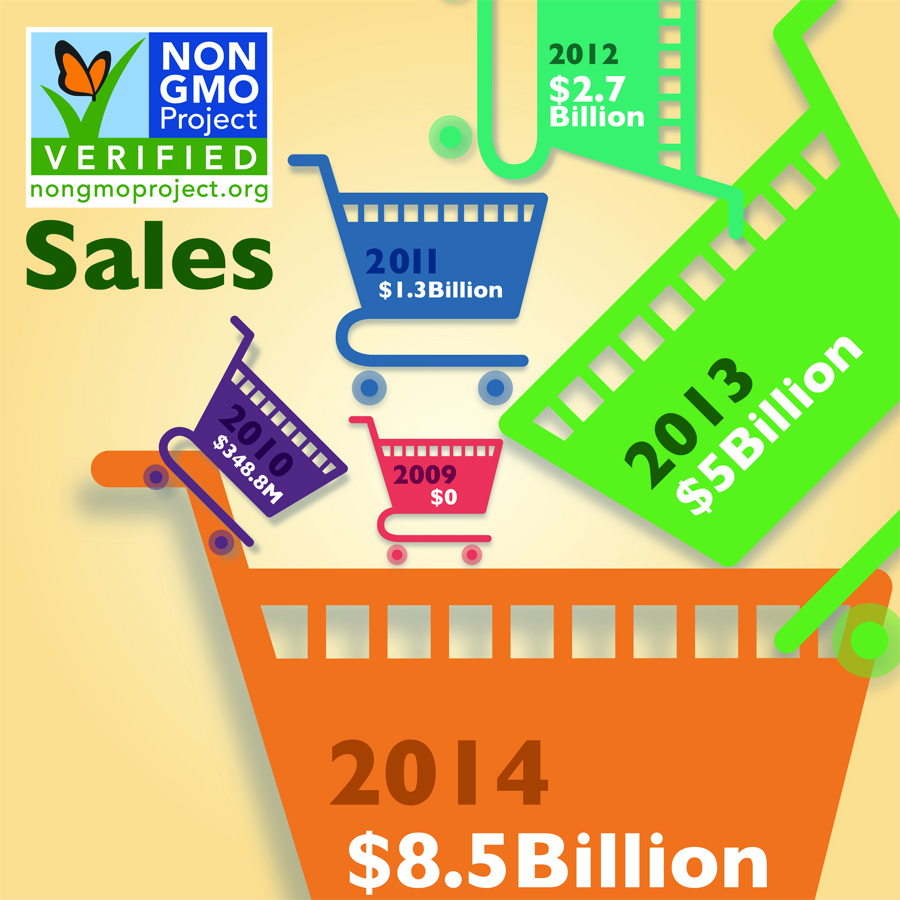
|
|
| The growth of Non-GMO Verified products from 2009 to 2014. |
“That’s a big change that has been underway for the past year-and-a-half and will continue to be a big focus. Prior to that, we only had one company doing all of our technical administration,” she states. “There’s a lot of efficiency gained in having unification among certifiers.”
Also to expand its reach, Westgate says her staff—just 15 people strong—is constantly self-evaluating and improving its standards and strategic outreach. To keep up with demand, Westgate has to double the size of the staff every six to 12 months. “Five years ago, it was just me. When I sit down and see all these talented, amazing, passionate, intelligent people who are working together on this cause, it’s incredibly heartwarming,” says Westgate.
Another of Westgate’s top priorities for the group right now is consumer outreach. The Non-GMO Project has been very supportive and involved in the various state-mandated labeling legislation efforts.
Westgate believes that it’s critical to mobilize social media and other outlets to raise awareness about non-GMO labeling efforts; her group’s Facebook page had 750,000+ likes as of December 2014, and it takes full advantage of those eyes and ears. Leading up to the GMO labeling vote in Oregon, for instance, the Non-GMO Project actively shared “Right to Know” materials, helping to make it one of the closest elections in the state’s history. “We keep a pulse on things like that and educate people about it as it’s happening,” says Westgate. “We see all the strategies as very complementary. Any effort to bring transparency and awareness to the issue is really important…I think it’s inevitable that we’ll see mandatory labeling, at least at the state level.”
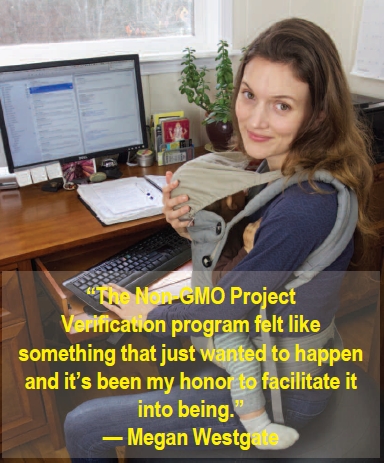 Also in the spirit of connecting with shoppers, at press time, the group was about to launch a lifestyles-focused Web site called “Living Non-GMO,” to give consumers information, support and a community of like-minded people who care about this issue. With recipes and expert bloggers, the Non-GMO Project hopes consumers will be able to find accessible and engaging information about issues surrounding GMOs and non-GMO products. In addition, the Non-GMO Project recently launched a new mobile shopping app that allows shoppers to scan a product’s barcode to learn about its GMO status and to submit requests for manufacturers to seek Non-GMO Project Verification.
Also in the spirit of connecting with shoppers, at press time, the group was about to launch a lifestyles-focused Web site called “Living Non-GMO,” to give consumers information, support and a community of like-minded people who care about this issue. With recipes and expert bloggers, the Non-GMO Project hopes consumers will be able to find accessible and engaging information about issues surrounding GMOs and non-GMO products. In addition, the Non-GMO Project recently launched a new mobile shopping app that allows shoppers to scan a product’s barcode to learn about its GMO status and to submit requests for manufacturers to seek Non-GMO Project Verification.
Reaching consumers directly is key to the non-GMO message. “The only way that the GMOs industry has gotten any traction is by being deceptive, by not allowing consumers to know what’s in their foods,” Westgate feels. “Consistently, we’ve seen that when people learn about GMOs, they don’t want them…it’s about raising awareness as opposed to convincing people that there are reasons to be concerned.”
In her heart, she believes genetic modification is actually a failing technology, since GM-plants are becoming resistant to the chemical herbicides and pesticides they are designed to withstand. While it may take years, Westgate feels GMO crops’ days are numbered.
In the meantime, Westgate is inspired by her staff, her family and the community of non-GMO advocates she helped to build to continue her journey to secure a safer, healthier, non-GMO food supply for future generations. Under her watch, the Non-GMO Project will continue to do its part to be good stewards of non-GMO labeling, preserve non-GMO products, educate consumers and help increase the availability of certified non-GMO options. WF
Published in WholeFoods Magazine, January 2015


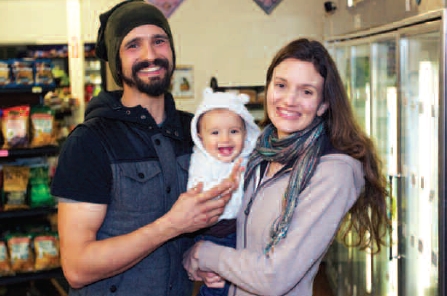
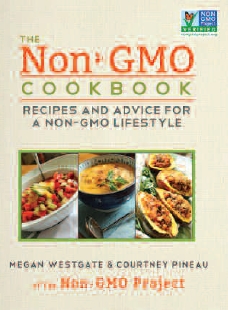 Community Food Co-Op in Bellingham, WA, recently serving as its chair and helping the community work on food security and the integrity of the region’s food supply.
Community Food Co-Op in Bellingham, WA, recently serving as its chair and helping the community work on food security and the integrity of the region’s food supply. feels daily practice is absolutely essential for a clear mind and uplifted spirit.
feels daily practice is absolutely essential for a clear mind and uplifted spirit.